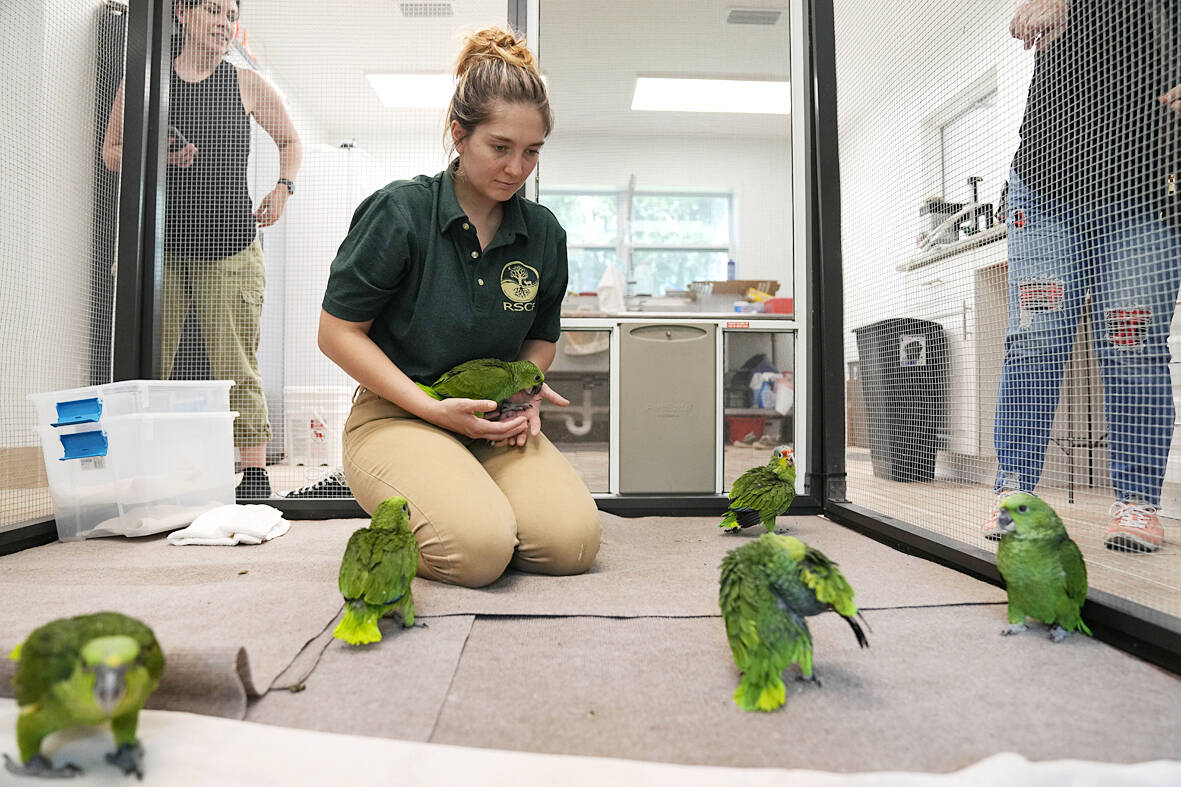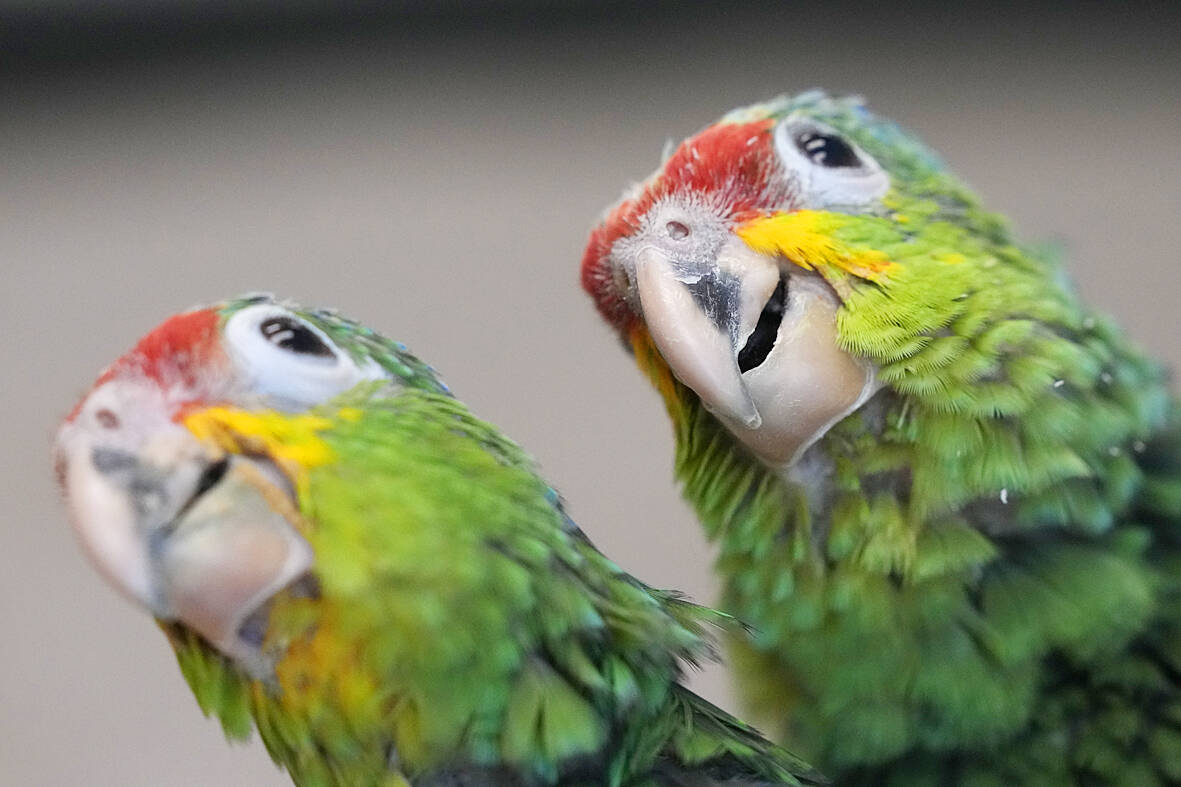The 24 bright green baby parrots began chirping and bobbing their heads the second anyone neared the large cages that have been their homes since hatching in March.
The Central American natives, seized from a smuggler at Miami International Airport, are being raised by the Rare Species Conservatory Foundation — a round-the-clock effort that includes five hand feedings a day in a room filled with large cages.
At just 9 weeks old, these parrots have already survived a harrowing journey after being snatched from their nests in a forest. They are almost fully feathered now and the staff has started transitioning them from a special formula to a diet of food pellets and fruit.

Photo: AP
“You ready to meet the children?” asked Paul Reillo, a Florida International University professor and director of the foundation, as he led visitors Friday into a small building tucked behind a sprawling house in Loxahatchee, a rural community near West Palm Beach.
“They are hand-raised babies,” he said, as the chicks squawked and looked inquisitively at the visitors. “They’ve never seen mom and dad; they’ve been raised by us since they hatched.”
It was the hatchlings’ faint chirping inside a carry-on bag at the Miami airport that brought them to the attention of a US Customs and Border Protection officer. The passenger, Szu Ta-wu, had just arrived on TACA Airlines flight 392 from Managua, Nicaragua, on March 23, and was changing flights in Miami to return home to Taiwan, according to a criminal complaint filed in US District Court in Miami.

Photo: AP
Officers stopped Wu at a checkpoint. He was asked about the sound coming from his bag, which Reillo later described as a “sophisticated” temperature controlled cooler.
Wu reached in and pulled out a smaller bag and showed the officer an egg, the complaint said. The officer then looked inside and saw more eggs and a tiny featherless bird that had just hatched.
He told the officer there were 29 eggs, and that he did not have documentation to transport the birds, according to the complaint.
Wu was arrested, and on May 5 pleaded guilty to charges of smuggling birds into the US. He faces up to 20 years in prison when he’s sentenced Aug. 1.
A lawyer who could speak on his behalf was not listed on court records, but Wu told investigators through a Mandarin interpreter that a friend had paid him to travel from Taiwan to Nicaragua to pick up the eggs. He denied knowing what kind of birds they were.
The officer took the bag and contacted the US Fish and Wildlife Service. By then, eight of the birds had already hatched or were in the process of hatching.
It didn’t take long for federal officials to reach out to Reillo.
“They didn’t know what these things were and wanted my advice on it,” Reillo said. Baby parrots are featherless, so it’s difficult to property identify them.
He helped set up a makeshift incubator in the US. Department of Agriculture’s aviary at the airport in a mad dash to save the now-hatching parrots.
The next day, Stacy McFarlane, a USDA veterinarian who initially tended to the birds and eggs at the airport, and other officials, delivered the baby parrots and remaining eggs to Reillo’s conservatory.
“At that point we were off to the races,” he said. “We’ve got all these eggs, the chicks are hatching, the incubator’s running and by the time it was all said and done, we hatched 26 of the 29 eggs, and 24 of the 26 chicks survived.”
USDA regulations required the birds to be quarantined for 45 days, meaning that Reillo and his team had to scrub down when entering and leaving the room.
But they still weren’t sure which of the 360 varieties of parrots they were dealing with.
A forensics team at Florida International extracted DNA samples from the eggshells and the deceased birds to identify the species. They discovered the 24 surviving parrots were from eight or nine clutches and included two species — the yellow naped Amazon and the red-lored Amazon.
Both birds are popular in the trafficking and caged-bird industries because they are pretty and have a nice temperament, Reillo said.
The trafficking pipeline out of Central America is well established and has gone on for years, he said.
“In fact, the biggest threat to parrots globally is a combination of habitat loss and trafficking,” Reillo said, adding that about 90 percent of eggs are poached for illegal parrot trade.
BirdLife International lists the yellow-naped Amazon as “critically endangered” with a population in the wild of between 1,000 and 2,500. The red-lored Amazon is also listed as having a decreasing population.
“The vast majority of these trafficking cases end in tragedy,” Reillo said. “The fact that the chicks were hatching the first day of his travel from Managua to Miami tells you that it’s extremely unlikely that any of them would have survived had he actually gotten all the way to his destination in Taiwan. That would have been another 24 to 36 hours of travel.”
Reillo is now faced with the challenge of finding a permanent home for the birds, which can live 60 to 70 years, or longer. He said he’s working with the US Fish and Wildlife Services on a plan “to have the birds fly free and help restore their species in the wild.”
“Parrots live a long time. They are sentient creatures. They’re highly intelligent, very social, and these guys deserve a chance,” he said. “The question will be where will they wind up? What is their journey going to be? It’s just beginning.”

On April 26, The Lancet published a letter from two doctors at Taichung-based China Medical University Hospital (CMUH) warning that “Taiwan’s Health Care System is on the Brink of Collapse.” The authors said that “Years of policy inaction and mismanagement of resources have led to the National Health Insurance system operating under unsustainable conditions.” The pushback was immediate. Errors in the paper were quickly identified and publicized, to discredit the authors (the hospital apologized). CNA reported that CMUH said the letter described Taiwan in 2021 as having 62 nurses per 10,000 people, when the correct number was 78 nurses per 10,000

As we live longer, our risk of cognitive impairment is increasing. How can we delay the onset of symptoms? Do we have to give up every indulgence or can small changes make a difference? We asked neurologists for tips on how to keep our brains healthy for life. TAKE CARE OF YOUR HEALTH “All of the sensible things that apply to bodily health apply to brain health,” says Suzanne O’Sullivan, a consultant in neurology at the National Hospital for Neurology and Neurosurgery in London, and the author of The Age of Diagnosis. “When you’re 20, you can get away with absolute

May 5 to May 11 What started out as friction between Taiwanese students at Taichung First High School and a Japanese head cook escalated dramatically over the first two weeks of May 1927. It began on April 30 when the cook’s wife knew that lotus starch used in that night’s dinner had rat feces in it, but failed to inform staff until the meal was already prepared. The students believed that her silence was intentional, and filed a complaint. The school’s Japanese administrators sided with the cook’s family, dismissing the students as troublemakers and clamping down on their freedoms — with

As Donald Trump’s executive order in March led to the shuttering of Voice of America (VOA) — the global broadcaster whose roots date back to the fight against Nazi propaganda — he quickly attracted support from figures not used to aligning themselves with any US administration. Trump had ordered the US Agency for Global Media, the federal agency that funds VOA and other groups promoting independent journalism overseas, to be “eliminated to the maximum extent consistent with applicable law.” The decision suddenly halted programming in 49 languages to more than 425 million people. In Moscow, Margarita Simonyan, the hardline editor-in-chief of the